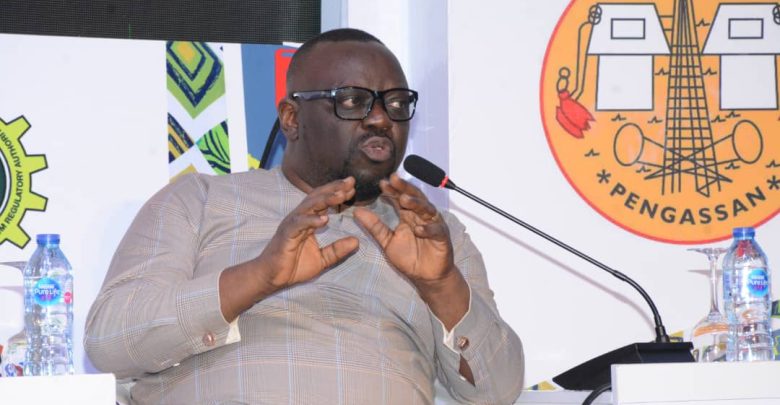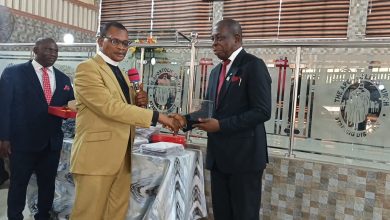Subsidy: Ex Guber Aspirant Urges Government To Invest in Four Key Sectors To Save Economy

Worried by the continuous downward slide of the nation’s economy after the recent withdrawal of the subsidy on fuel, a former governorship aspirant on the platform of the Peoples Democratic Party (PDP) in Akwa Ibom State, Obong Ide Owodiong-Idemeko has urged the Federal Government to immediately invest the funds saved from subsidy in four key areas of the economy to reap the gains of the policy.
Ide Owodiong-Idemeko, who was one of the panellists at the ongoing 2023 PENGASSAN Energy and Labour Summit held at the Transcorp Hilton Hotel, Abuja identified the areas to include: Education, Health, Agriculture and Transportation.
The Summit has as its theme, “Petroleum Downstream Deregulation and Gas Utilisation: For a Sustainability Energy Future in Nigeria” and was declared open by the Senate President, His Excellency, Godswill Obot Akpabio, represented by the Senate Committee Chairman on Petroleum.
The panel discussion focused on “Fuel Subsidy Removal: Balancing National Economic Realities and Social Impact” and had dignitaries and experts in the industry such as Comrade Peter Esele, former President of TUC and PENGASSAN; Yusuf Lawal Othman, National President of Nigeria Association of Road Transport Owners (NARTO) and Engr. Razaq Obe, Commissioner for Energy and Mineral Resources, Ondo State to do justice to the topic.
Speaking on the way forward for Nigeria after the subsidy removal on fuel, Obong Owodiong-Idemeko recalled that the Nation had earlier earmarked the sum of three trillion naira to pay for the subsidy in the budget without any idea of how to raise such funds.
Read Also: Pastor Umo Eno Will Be Responsive to the Needs Of Akwa Ibom People – Ide Owodiong
While describing the subsidy removal as the way forward for the country, he noted that the sudden removal has taken a toll on low-income earners.
According to him, “It is instructive to know that even the three trillion naira that was in the budget was not money that is readily available thus the step that has been taken is good when you don’t even have the money you captured in the budget.”
“We also have to look at the immediate effects of the subsidy removal which include an increase in inflation and poverty level, hardship and inequalities in the various segments of the society, all these we have to deal with in the short term while looking forward to reaping the benefits of the subsidy removal in the long term”.
He further highlighted, “It is obvious that the subsidy has denied the nation of the money that would have been put into other areas of investment when you look at the data available between 2010-2020, we spent about $40 billion on foreign exchange for both education and health tourism of which about $11 billion was on health tourism.
“I think the government has to look at this, if we take the money out of subsidy and spend it on significant upgrades of our educational facilities and quality of learning in our institutions, tertiary, secondary and primary schools, then a significant amount of money will be saved and pressure will reduce on foreign exchange.”
Read Also: Fuel Subsidy Removal And The Heat On Nigerians
The former ExxonMobil Executive maintained that the education and health sectors are two areas that can equalise the existing gaps and reduce inequalities within the social categories and social classes in the country, stressing that most middle-class Nigerians strive to send their children abroad for studies because of the poor quality of education in the country.
“If we take what we spent for the first 10 months of 2022 on education which records put at about 1.3 billion dollars and put that back into our education system, it will provide quality and accessible education for all classes of people to study in Nigeria,” he added.
On Agriculture, Obong Owodiong-Idemeko stated that the country spent about N2 trillion on food importation in 2022 and “that is an area with significant impact on low-income earners. If we can invest such money back in our agricultural sector, it will create much impact as food will be cheaper and inflation, hunger, and poverty will be addressed.
He also urged the government to invest in transportation to help the already challenged masses go about their daily activities with fewer challenges.
“As identified, the four key areas of investment to reap the benefits of subsidy removal on fuel remain the Health Sector, Education Sector, Agriculture and transportation sectors and I urge government and individuals to position themselves to maximize the benefits that will arise from these areas if what is right is done,” he concluded.




